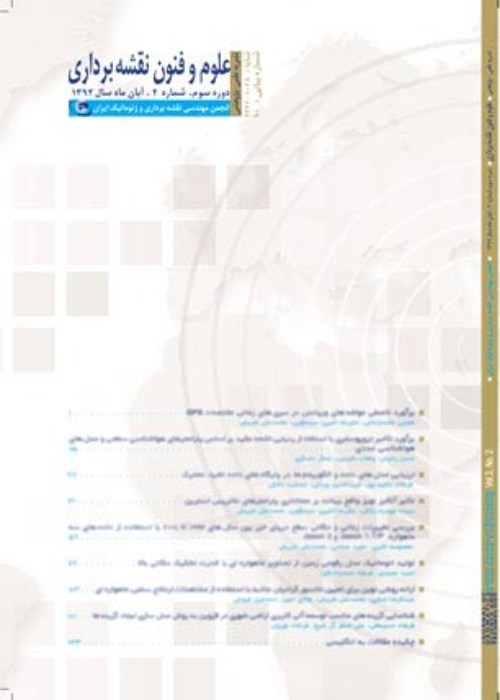Developing a Web-Based Collaborative Spatioal Decsion Support System Based on User-Centered Spatial Alternatives (Case Study: Public Toilet of District #1 of Mashhad)
Author(s):
Abstract:
Combination of GIS and Multicriteria Decision Analysis (MCDA) in the Web setting has recently gained much attention in participatory (collaborative) spatial decision making. GIS-based MCDA tools offer a wide spectrum of visual and computational decision support capabilities that can be used by the experts and lay participants on the Web for selection, prioritization, and integration of spatial decision options. These tools provide appropriate analytical tools and platforms for direct involvement of the public in the spatial planning process. The overall aim of GIS-based MCDA techniques is to contribute to the decision making process by selecting the best alternative from the number of feasible alternatives according to multiple criteria. It involves the use of geographical data, decision maker preferences, and an aggregation function (decision rule) that combines spatial data and the decision makers preference to evaluate decision alternatives. The main rationale behind integrating GIS and MCDA is that these two separate areas of research can complement each other. While GIS is normally known as a powerful and integrated tool with exclusive abilities for storing, manipulating, analyzing and visualizing geographically referenced information for decision-making, MCDA provides a rich collection of procedures and algorithms for structuring decision problems, designing, evaluating and prioritizing alternatives. Studies on the asynchronous spatial MCDA suggest that the space-time distributed environment of the Internet not only provides the flexibility to work in different places and times for the convenience of the participants, but also offers equal participation opportunity. In other words, the Web-based GIS-MCDA provides an access to the relevant GIS-MCDA data and tools anyplace (any location that has the Internet access), anytime (24 hours a day, seven days a week), and through any PCs or handheld devices (e.g., PDA, smart phones) and networks (wired or wireless technologies).
However, the currently used GIS-MCDA tools do not provide the participants with a choice of their own criteria, alternatives, and preferences. To address this problem, this study represents a user-oriented GIS-MCDA system where decision participants can (i) define their own alternatives and determine individual decision maps and (ii) integrate their individual decision maps using a group decision rule to reach a compromise solution. The problem of public toilet site selection in district #1 of Mashhad, Iran, was selected as the case study to demonstrate the proposed approach. The proposed system was used as a potential decision support tool for collaborative site selection of the public toilets. Every decision maker could define his/her toilet alternatives by drawing a set of polygons, evaluate them based on AHP-based weighted linear combination and eventually develop an individual decision map. The group decision rule, fuzzy majority approach, was employed to create a group decision map based own individual solution maps. In other words, the individual solutions (individual rankings of public toilet facilities) are aggregated using the group decision rule to obtain a group solution (group rankings of public toilet facilities). Such tool enhances the level of community participation in spatial planning. The studys implications can advance public participatory planning and allow for more informed and democratic land-use decisions.
However, the currently used GIS-MCDA tools do not provide the participants with a choice of their own criteria, alternatives, and preferences. To address this problem, this study represents a user-oriented GIS-MCDA system where decision participants can (i) define their own alternatives and determine individual decision maps and (ii) integrate their individual decision maps using a group decision rule to reach a compromise solution. The problem of public toilet site selection in district #1 of Mashhad, Iran, was selected as the case study to demonstrate the proposed approach. The proposed system was used as a potential decision support tool for collaborative site selection of the public toilets. Every decision maker could define his/her toilet alternatives by drawing a set of polygons, evaluate them based on AHP-based weighted linear combination and eventually develop an individual decision map. The group decision rule, fuzzy majority approach, was employed to create a group decision map based own individual solution maps. In other words, the individual solutions (individual rankings of public toilet facilities) are aggregated using the group decision rule to obtain a group solution (group rankings of public toilet facilities). Such tool enhances the level of community participation in spatial planning. The studys implications can advance public participatory planning and allow for more informed and democratic land-use decisions.
Keywords:
Language:
Persian
Published:
Journal of Geomatics Science and Technology, Volume:6 Issue: 1, 2016
Pages:
101 to 115
magiran.com/p1594803
دانلود و مطالعه متن این مقاله با یکی از روشهای زیر امکان پذیر است:
اشتراک شخصی
با عضویت و پرداخت آنلاین حق اشتراک یکساله به مبلغ 1,390,000ريال میتوانید 70 عنوان مطلب دانلود کنید!
اشتراک سازمانی
به کتابخانه دانشگاه یا محل کار خود پیشنهاد کنید تا اشتراک سازمانی این پایگاه را برای دسترسی نامحدود همه کاربران به متن مطالب تهیه نمایند!
توجه!
- حق عضویت دریافتی صرف حمایت از نشریات عضو و نگهداری، تکمیل و توسعه مگیران میشود.
- پرداخت حق اشتراک و دانلود مقالات اجازه بازنشر آن در سایر رسانههای چاپی و دیجیتال را به کاربر نمیدهد.
In order to view content subscription is required
Personal subscription
Subscribe magiran.com for 70 € euros via PayPal and download 70 articles during a year.
Organization subscription
Please contact us to subscribe your university or library for unlimited access!


